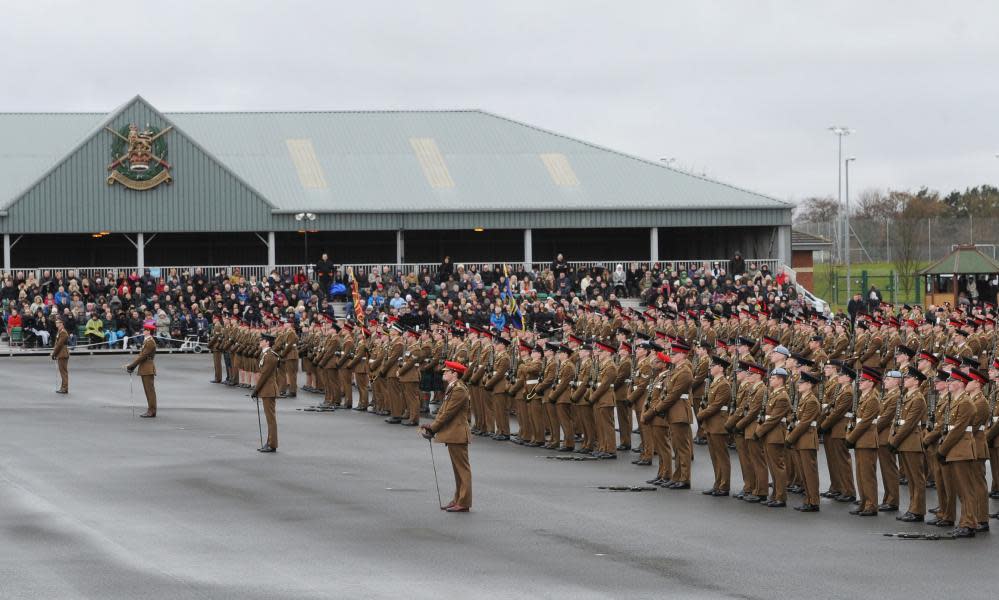UK army investigators under fire as bullying trial collapses

A judge has criticised military investigators after the collapse of a case against army instructors who were accused of bullying teenage recruits.
Twenty-eight soldiers aged 16 and 17 had claimed they were abused and assaulted by 16 instructors during a battle camp exercise.
They said they were slapped or punched in the face, spat at, grabbed by the throat, had their faces submerged in mud and were ordered to eat manure.
The trial process began last month but was stopped after flaws in the way the special investigation branch (SIB) of the Royal Military police handled the case.
An SIB investigator did not speak to possible witnesses including an army major because she assumed they would not be honest about what they had seen.
It took more than three and a half years for the case to reach the trial stage. An investigator said the process was hampered by a lack of resources and staff shortages but the delay was also judged to be unfair to the defendants, who were all corporals or sergeants.
Some campaigners have argued that the collapse of the case shows lessons have not been learned since the discredited Deepcut investigation into the deaths of young recruits at a barracks in Surrey.
The case centred on allegations of the ill treatment of junior soldiers within the Army Foundation College in Harrogate.
Jamie Benjafield, who was medically discharged from the army last year, claimed in court he was assaulted as he ran between two hills nicknamed heaven and hell. He said a staff sergeant spat in his face and at other recruits.
“He would scream in your face, saying abusive stuff. He said to me, ‘I am going to rape your baby’ and he waited a few seconds and he spat in my face,” he said. “At the time we thought what they were doing was part of the training. I was expecting it to be tough but nothing like it was.”
Joe Van den Akker, who has since left the Rifles, said an instructor used his fingers to open his mouth before putting animal manure in. He also said he was crawling through water when his head was pushed under.
Joe Carroll, who has left the army, said he saw colleagues thrown to the ground by instructors in the hangar where they were sleeping. “We got told it was all part of the training and that’s what’s supposed to happen and it was just to get us psyched up and ready for it,” he said.
The assistant judge advocate general Alan Large, who oversaw the case at the military court centre in Bulford, Wiltshire, said: “The decision to rule out army instructors, warrant officers, a number of captains and a major who was entrusted with the welfare and training of a company of army recruits … was seriously flawed.”
He said: “The investigator should pursue all reasonable lines of inquiry, whether they point towards or away from the suspect. The decision not to interview at any stage during a very long inquiry such highly relevant eyewitnesses is a very serious breach of duty upon police officers to investigate a case fairly and objectively.”
The defendants were not arrested and interviewed under caution until September 2016. The trial stage was reached in February.
An SIB investigator, Capt Teresa Spanton, told the court martial that the resources available had “seriously impeded” the investigation. She flagged up staff shortages and pressure from more urgent inquiries.
But Large said: “None of these is an acceptable reason for such a large investigation proceeding so slowly.”
Rachel Taylor, the director of programmes at the charity Child Soldiers International, said: “Twenty years on, the echoes of Deepcut are still all too strong. Army training is by its nature secretive, violent and conducted in isolation, which makes it essential that allegations of mistreatment are investigated in conditions of absolute independence and transparency.”
The Peace Pledge Union said the collapse of the Harrogate inquiry was further evidence that the armed forces should not be allowed to police themselves or try alleged abusers in their own courts.
Emma Norton, the head of legal casework at Liberty, said: “When someone commits a crime on British soil – whether soldier or civilian – that crime should be investigated by civilian police.”
An army spokeswoman said: “Despite the outcome, we will consider carefully whether any internal disciplinary action is necessary. Given this ruling, the Service Prosecuting Authority and the Royal Military police will be conducting a review to ensure that lessons are learned.”
Col Marcus Simson, deputy assistant chief of staff, personnel services in the Army Personnel Services Group, said: “Bullying is not tolerated and tough action is taken against those who fall short of our high standards.”

 Yahoo News
Yahoo News 
